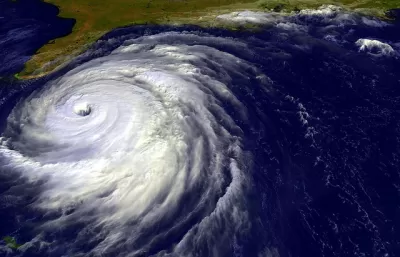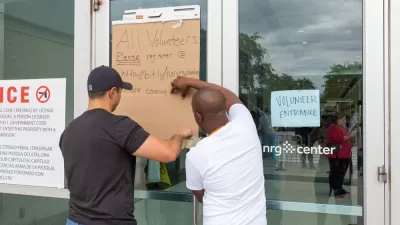Code requirements for wind resistance vary substantially across Florida, with less stringent building requirements in areas of the Panhandle hit hard by Hurricane Michael.

In Hurricane Michael's aftermath, it's devastatingly clear that structures in the storm's path were unable to weather a Category 4 storm. Florida code requirements are the most stringent in South Florida, Andres Viglucci, David Ovalle, Caitlin Ostroff, and Nicholas Nehamas report. However, "they taper down the farther north you move along the peninsula. In most of the Panhandle, the code requirements are significantly less stringent."
For instance, structures in Miami-Date County must be able to withstand winds of 175 miles an hour, while "along the stretch of the Panhandle hit hardest by Michael — including Mexico Beach, Apalachicola and Panama City — the design standard drops to as low as 120 miles an hour before rising gradually to 150 mph around Pensacola at the state's far western edge."
FULL STORY: Florida’s building code is tough, but Michael was tougher. Is it time for a rewrite?

Alabama: Trump Terminates Settlements for Black Communities Harmed By Raw Sewage
Trump deemed the landmark civil rights agreement “illegal DEI and environmental justice policy.”

Planetizen Federal Action Tracker
A weekly monitor of how Trump’s orders and actions are impacting planners and planning in America.

The 120 Year Old Tiny Home Villages That Sheltered San Francisco’s Earthquake Refugees
More than a century ago, San Francisco mobilized to house thousands of residents displaced by the 1906 earthquake. Could their strategy offer a model for the present?

In Both Crashes and Crime, Public Transportation is Far Safer than Driving
Contrary to popular assumptions, public transportation has far lower crash and crime rates than automobile travel. For safer communities, improve and encourage transit travel.

Report: Zoning Reforms Should Complement Nashville’s Ambitious Transit Plan
Without reform, restrictive zoning codes will limit the impact of the city’s planned transit expansion and could exclude some of the residents who depend on transit the most.

Judge Orders Release of Frozen IRA, IIJA Funding
The decision is a victory for environmental groups who charged that freezing funds for critical infrastructure and disaster response programs caused “real and irreparable harm” to communities.
Urban Design for Planners 1: Software Tools
This six-course series explores essential urban design concepts using open source software and equips planners with the tools they need to participate fully in the urban design process.
Planning for Universal Design
Learn the tools for implementing Universal Design in planning regulations.
Clanton & Associates, Inc.
Jessamine County Fiscal Court
Institute for Housing and Urban Development Studies (IHS)
City of Grandview
Harvard GSD Executive Education
Toledo-Lucas County Plan Commissions
Salt Lake City
NYU Wagner Graduate School of Public Service





























